CLELCON25 Tell Us Your Thoughts!
Thank you for participating in CLELCON25. We hope you had as much fun attending as we did organizing it.
The Conference team wants to hear your feedback so we can keep improving our logistics and content. Please fill out this quick survey and let us know your thoughts.
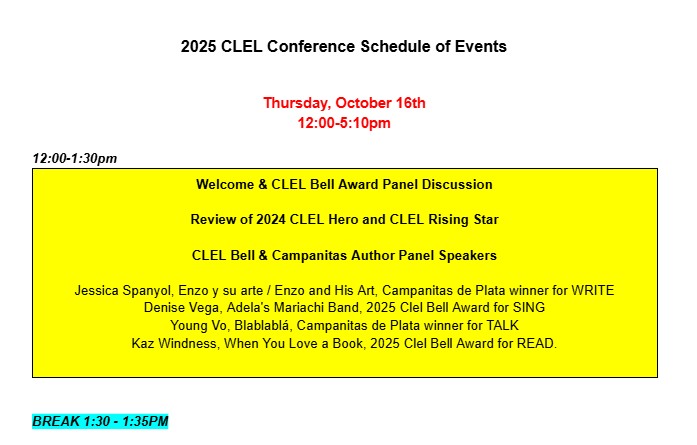
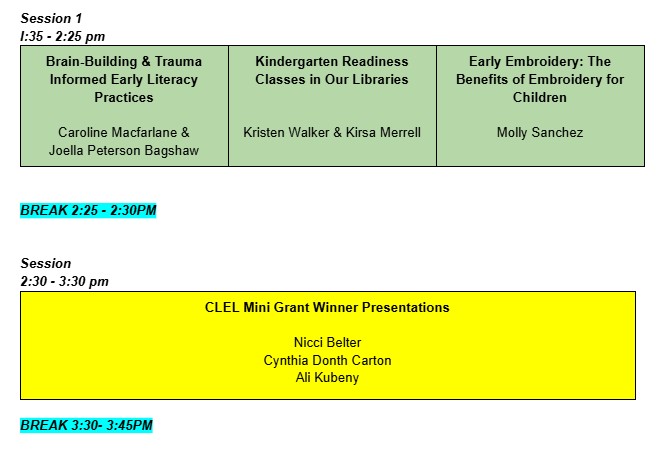
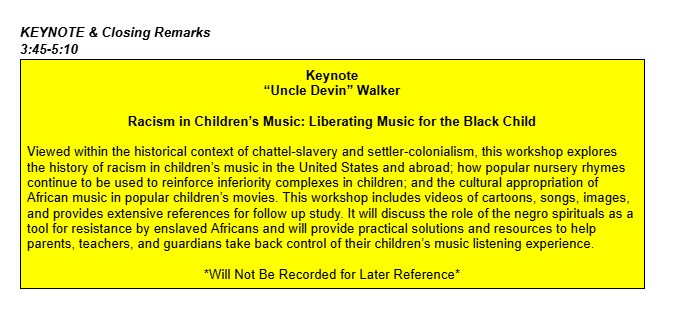
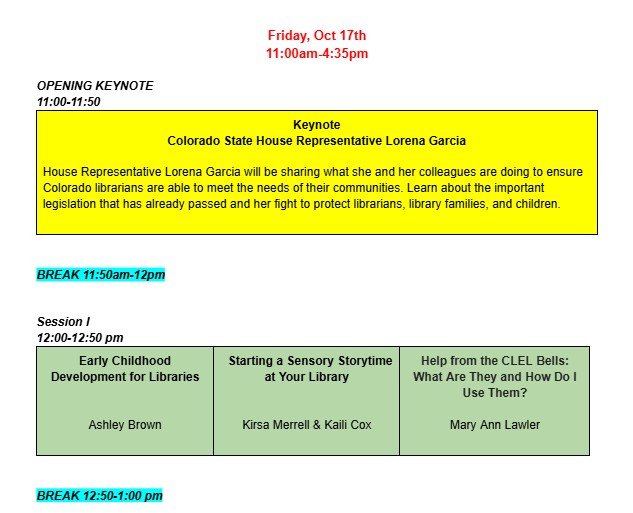
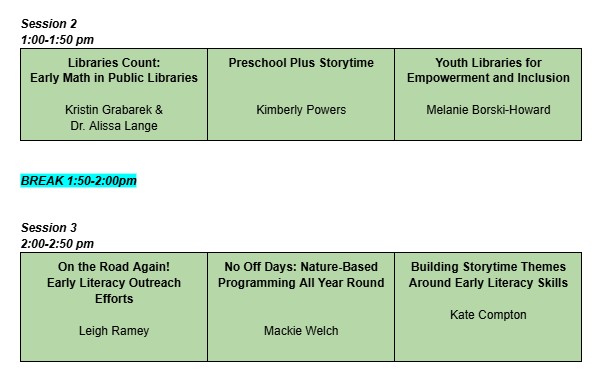
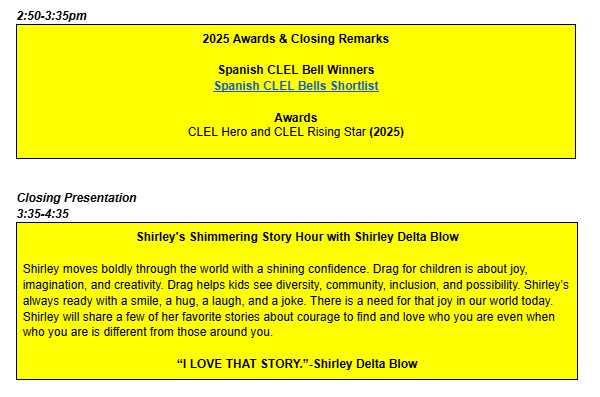
Session Descriptions
Brain-Building & Trauma Informed Early Literacy Practices
Understanding how children’s brains grow and develop is a crucial part of early literacy. But for children who have undergone trauma or toxic stress, regular brain growth can be altered, leading to developmental delays. We will share insight into trauma informed practices at Storytime and other early literacy-based library programs — from our professional and personal experiences.
Kindergarten Readiness Classes in Our Libraries
Learn how to plan for and teach a kindergarten readiness class in a public library setting. Learn how to include reading, writing, singing, playing, phonemic awareness skills, and social skills as part of the class. Learn the logistical nuts and bolts of how to teach a class like this.
Early Embroidery: The Benefits of Embroidery for Children
Embroidery is an art that is simple in its craft but has a major positive impact throughout the learning of it. Early Embroidery will cover how teaching embroidery to young children can have a range of benefits. It helps develop fine motor skills, hand-eye coordination, stress relief, and being involved with project-based learning. This presentation will cover how this program came to be and how to cover a wide range of age groups so that everyone can be involved no matter their experiences.
Early Childhood Development for Libraries
A basic understanding of early childhood (birth-5 years old) development can add valuable information to your toolbox about how to interact with children and families in library contexts. This Crash Course is designed to educate participants on historical and current research that can be turned into best practices in libraries, including how to make simple modifications to make programming and spaces more inclusive.
Starting a Sensory Storytime at Your Library
Learn the building blocks for starting and growing a sensory Storytime at your library. Creating programs for individuals with sensory needs from scratch can seem daunting. The presenters will discuss their experiences starting and growing these programs at their respective libraries, with tips for successful Storytime activities, identifying community partners, and running a sensory storytime on a low budget.
Help from the CLEL Bells: What Are They and How Do I Use Them?
Presented by the CLEL Bell Chairs, step up your Storytimes with books that naturally connect to early literacy tips! Discover the CLEL Bells- the early literacy focused book awards that recognize new English and Spanish titles that align with the Every Child Ready to Read Skills of Read, Sing, Talk, Write, and Play. Learn how you can use them in Storytime or to strengthen your reader’s advisory skills and learn a bit about the committee.
Building Storytime Themes Around Early Literacy Skills
Want to take your Storytime to the next level but feel boxed in by themes? In this interactive session, you’ll dive into the core principles of the Every Child Ready to Read® initiative and explore the Bay Area Discovery Museum’s Reimagining School Readiness Toolkit. Together, we’ll unpack how stories, songs, and activities can be intentionally aligned with early literacy skills—transforming your Storytime into a powerful, skill-building experience for young learners.
Libraries Count: Early Math in Public Libraries
Public libraries have grown from supporting early literacy to supporting school readiness as a whole, and now are beginning to embrace the importance of math as a part of school readiness. Indeed, some studies suggest that early math skills are a better predictor of student success than early literacy skills! With this in mind, it is important for librarians to have a working knowledge of early math skills and some tools and ideas for incorporating those skills into programs and services in diverse communities. Participants in this session will explore key early math concepts as well as learn simple, low-cost, low-effort ways to support those concepts in diverse library settings.
Preschool Plus Storytime
Our Preschool Plus Storytime (Ages 3–6) was developed in response to interest from preschool and kindergarten homeschool families who were seeking a storytime experience that offered more books, educational content, and opportunities for collaborative play. In this session, we will explore both the advantages and challenges of implementing a Preschool Plus Storytime. Together, we’ll also brainstorm and identify age-appropriate educational activities and collaborative play ideas that can be incorporated into your program to enhance learning and engagement.
On the Road Again! Early Literacy Outreach Efforts
It’s an exciting time for library outreach, as new opportunities for connection with communities serving young children and their caregivers pop up all around us! Most libraries have dedicated outreach efforts, but how much of that is focused on supporting babies, toddlers, and preschoolers and those who care for them? In this session, we’ll look at targeted ways to increase our programming and services for our youngest patrons during off-site visits by examining ideas and examples for the following questions. Where are new places you might visit? How can you create an early literacy outreach event kit? What elements can you add to your bookmobile/outreach vehicle to appeal to families with young children? Explore all these ideas and more and share what works for your communities!
No Off Days: Nature-Based Programming All Year Round
Studies show the benefits of nature on early learning. But how do you maintain nature programming all year when weather and access to green spaces fluctuate from library to library? This presentation will introduce paired preschool-aged nature programs: Tales and Trails and Preschool Explorers. Both programs are nature-focused, with very different locations throughout the year. Come get inspired to maintain your nature-based programming throughout the year or to start a new program from scratch!
Youth Libraries for Empowerment and Inclusion
Director Michael Moore said, “[Librarians] are subversive. You think they’re just sitting there at the desk, all quiet and everything. They’re like plotting the revolution, . . .” In this session, let’s discuss how we can plot a revolution. We will talk about Drag Story Hour, Race in Storytime, and Project Ready and more. Let’s talk about the big and small things we can do and are doing in our libraries to make a difference during these turbulent times. Bring your ideas, successes, missed opportunities and even blunders.
CLELCON2025 – Registration is now open

Click here to go to the Registration Page: https://www.clicweb.org/events/2025-clel-virtual-conference-registration/
The conference will be virtual again this year (hosted on Zoom) and take place in the afternoons of October 16 and 17, 2025.
*Please note the times are slightly different from what was originally announced.
Thursday, October 16 from 12:00 to 5:10 & Friday, October 17 from 11:00-4:35
CLELCON is an annual, affordable conference featuring workshops, keynote speakers and networking around the topic of early literacy in libraries. It is open to anyone who is involved or wants to be involved with early literacy. Visit the conference archives to view CLELCON materials from 2012 to the present.
About CLELCON
Colorado Libraries for Early Literacy is committed to training and staff development. During our annual conference we provide workshops, keynote speakers and networking to anyone who is involved or wants to be involved with early literacy. What began in 2008 as a small annual meeting has turned into a full day conference that attracts hundreds of attendees, including many from out of state, and is recognized nationwide as a premier early literacy professional development opportunity.
From the beginning, CLEL has been committed to accessibility. Membership is free and conference costs are kept to a minimum to encourage and allow broad participation for library staff, students, volunteers, and trustees in libraries in Colorado and beyond.
In 2020 the Conference Committee continued to provide low-cost, high quality professional development while pivoting to a virtual environment. The first virtual CLELCON drew speakers and participants from across the country. CLEL also introduced the Leadership Institute to the conference in 2020. In 2022, the leadership Institute was reimagined as a learning track, with pertinent sessions available on both days of the conference.
2025 Annual Conference Speakers
Uncle Devin
Thursday, October 16th
3:45 – 5:10 PM

Colorado State House Representative Lorena Garcia
Friday, October 17th
11 – 12 PM

Shirley’s Shimmering Story Hour with Shirley Delta Blow
Friday, October 17th
3:35 – 4:35 PM

